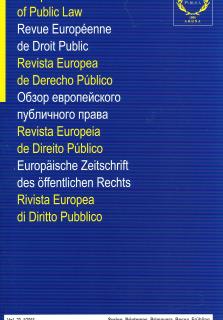
Global Administrative Legal Order
from a Greek Perspective
In accordance with the Greek Constitution and in observance of the Greek administrative law, Greece participates in international organisations and in plurilateral, as well as in bilateral, agreements concerning administrative law matters. The government regularly reports to the international and EU officials and follows their recommendations. Only after the rating of the Greek economy to a junk status and the conclusion of the EU-IMF Memorandum, has the Greek government been required to modernise administrative law and to radically reshuffle public administration, under close consultation with IMF, ECB and EU Commission, which obviously raises constitutionality issues. Moreover, Greece respects non-binding instruments of international organisations and participates in implementation networks, as well as in networks of global and foreign private regulatory bodies, and even respects recommendations from bodies to which it is not a member. Greece has recently applied to ICANN for being licenced to use ‘.gr’ by its Greek initials (‘.ελ’) as a new Country-Code Top Level Domain. E-government in Greek language is apparently a constitutive element of the Greek State, while the involvement of the country in such global private regulatory bodies is not laid down by the Greek Constitution.





















